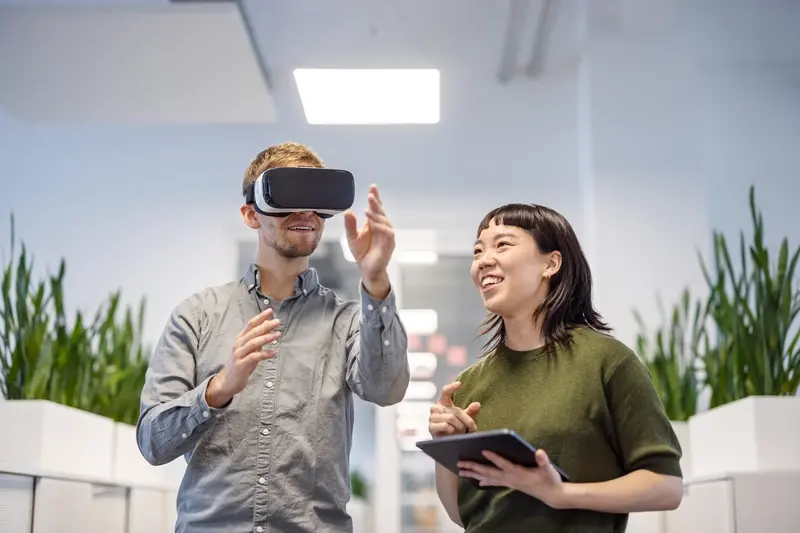What's The Difference Between AI And Machine Learning In Apps?
Have you ever wondered why some mobile apps seem to know exactly what you want before you even ask? After eight years of building apps for companies big and small, I can tell you that the secret often lies in two powerful technologies: artificial intelligence and machine learning. But here's the thing—most people use these terms like they mean the same thing, when actually they're quite different.
The confusion is understandable. Both AI and machine learning make apps smarter and more helpful. They're the reason your photo app can recognise your friends' faces, why your music app suggests songs you'll love, and why your shopping app knows what products to show you. But knowing which technology to use in your mobile app project can make the difference between building something brilliant and building something that falls flat.
The biggest mistake I see developers make is choosing complex AI solutions when simple machine learning would do the job better, faster, and cheaper.
In this guide, we'll break down exactly what each technology does, how they work in mobile apps, and most importantly, how to choose the right one for your project. Whether you're a business owner planning your first app or a developer looking to understand these technologies better, you'll walk away with a clear understanding of when to use AI versus machine learning in your mobile app development journey.
What Is Artificial Intelligence in Mobile Apps
Artificial Intelligence in mobile apps is basically software that can think and make decisions like a human would. Well, sort of anyway! It's not quite as clever as the robots you see in films, but it's pretty smart stuff that helps apps understand what you want and respond in useful ways.
When you open your phone's camera and it automatically recognises your face to unlock it—that's AI at work. Or when you ask Siri a question and she gives you a proper answer rather than just staring blankly at you. The AI is processing what you've said, working out what you mean, and then figuring out the best response.
How AI Makes Apps Smarter
AI helps apps do things that would normally need a human brain to figure out. It can recognise patterns, understand speech, translate languages, and even predict what you might want to do next. The clever bit is that it doesn't just follow a simple set of rules—it actually learns and adapts based on the information it receives.
Real Examples You Use Every Day
Netflix recommending films you might like? That's AI. Your email app filtering out spam? AI again. Even your phone's keyboard getting better at predicting what word you're typing—yep, that's AI too. It's everywhere, quietly making your apps work better without you even noticing.
Understanding Machine Learning and How It Works
Machine learning is one of those terms that gets thrown around a lot these days, but what does it actually mean? At its core, machine learning is a way of teaching computers to learn patterns and make decisions without being explicitly programmed for every single situation. Think of it like teaching a child to recognise different dog breeds—you show them lots of pictures of labradors, pugs, and golden retrievers, and eventually they start spotting the differences themselves.
In mobile app development, machine learning works by feeding large amounts of data into algorithms that can identify patterns and make predictions. The process involves training the system on historical data, testing its accuracy, and then letting it make decisions on new information it hasn't seen before. For example, a music app might analyse your listening habits to suggest new songs you'll enjoy.
Types of Machine Learning in Mobile Apps
- Supervised learning: Uses labelled data to train the system
- Unsupervised learning: Finds patterns in unlabelled data
- Reinforcement learning: Learns through trial and error with rewards
Start small with machine learning in your mobile app—focus on one specific feature like recommendation systems before expanding to more complex implementations.
The beauty of machine learning in mobile apps is that it gets smarter over time. The more data it processes, the better its predictions become, creating a more personalised experience for users.
The Key Differences Between AI and Machine Learning
Right, let's get this straight once and for all—AI and machine learning aren't the same thing, even though people use them interchangeably all the time. I see this confusion constantly when clients come to me wanting to build apps, and honestly, it's understandable because the tech world loves its buzzwords!
Think of AI as the big umbrella term. It covers any technology that makes computers act smart or human-like. Machine learning is just one way to achieve that artificial intelligence—it's a specific method where computers learn from data rather than following pre-written rules.
The Main Differences
- AI can work with pre-programmed rules (like a chatbot with scripted responses)
- Machine learning needs data to learn patterns and make predictions
- AI systems can be built without any learning capability
- Machine learning systems get better over time as they see more data
- AI covers everything from simple rule-based systems to complex neural networks
- Machine learning is always about finding patterns in data
Here's what matters for your app: if you want your app to follow specific rules and respond predictably, traditional AI might be enough. But if you want your app to personalise content, recognise images, or predict user behaviour, you'll need machine learning. The choice depends on whether your app needs to learn and adapt—or just follow instructions really well.
How AI and Machine Learning Are Used in Different Types of Apps
After years of building mobile apps, I've watched AI and machine learning spread across every type of app you can think of. Shopping apps use machine learning to show you products you're likely to buy based on your browsing history—it's like having a personal shopper who remembers everything you've ever looked at. Social media apps use AI to decide which posts appear in your feed; they're constantly learning what keeps you scrolling.
Music streaming apps are brilliant at this stuff. They analyse what songs you skip, what you play on repeat, and even what time of day you listen to certain genres. Fitness apps use machine learning to adapt your workout plans based on your progress, while navigation apps learn from traffic patterns to suggest the fastest routes.
Entertainment and Gaming Apps
Gaming apps use AI to create smarter opponents that adapt to your playing style—making games more challenging as you improve. Dating apps use machine learning algorithms to match people based on their swiping patterns and preferences.
The beauty of machine learning in mobile apps is that it gets smarter the more people use it, creating a better experience for everyone involved.
Banking apps use AI for fraud detection, spotting unusual spending patterns instantly. Photo apps automatically organise your pictures by recognising faces and locations. The technology is everywhere, quietly working behind the scenes to make our apps more useful and personalised.
Benefits and Limitations of Each Technology
After working with both AI and machine learning in mobile apps for years, I've seen what works brilliantly and what doesn't. Let me break down the real benefits and limitations you'll face with each technology.
AI Benefits and Drawbacks
AI shines when you need human-like interactions—chatbots, voice assistants, and recommendation systems work incredibly well. Your users get instant responses and personalised experiences that feel natural. The big win? AI can handle complex tasks that would otherwise need human intervention, saving you money and improving user satisfaction.
But here's the catch: AI systems are expensive to build and maintain. They need constant updates, loads of data, and skilled developers who don't come cheap. Plus, they can make mistakes that are hard to predict or explain to users.
Machine Learning Pros and Cons
Machine learning excels at spotting patterns and making predictions—think fraud detection, image recognition, or predicting user behaviour. It gets smarter over time without you having to manually program every scenario. The learning aspect means your app improves automatically as more people use it.
The downside? You need lots of high-quality data to train these systems properly. Poor data means poor results. Machine learning models can also be biased if your training data isn't representative of all your users.
Choosing the Right Technology for Your App Project
After eight years of building mobile apps, I can tell you that picking between AI and machine learning isn't always straightforward. The decision depends on what you're trying to achieve and—let's be honest—your budget. If you want your app to respond to voice commands, recognise faces, or have conversations with users, you'll need AI. But if you're looking to spot patterns in user behaviour, recommend products, or predict what content someone might like, machine learning is your best bet.
Think about your app's main purpose first. A fitness app that tracks your running route? Basic machine learning will do the job perfectly. A virtual assistant that answers questions and controls smart home devices? You'll need the full power of AI for that level of interaction.
Start with machine learning if you're unsure—it's often cheaper to implement and can always be expanded into full AI capabilities later as your app grows.
Budget plays a huge role too. Machine learning projects typically cost less because they focus on one specific task. AI implementations require more complex systems and ongoing maintenance. Don't forget about your team's technical skills either; machine learning is generally more accessible for developers who are new to these technologies.
Common Mistakes When Building AI and ML Apps
I've seen countless app projects go wrong over the years, and when it comes to AI and machine learning apps, the mistakes can be particularly costly. The biggest error I encounter is people thinking they need AI when they actually don't. They get caught up in the excitement of having a "smart" app without considering whether their problem actually needs machine learning to solve it.
Another massive mistake is not having enough data—or worse, having poor quality data. Machine learning models are only as good as the information you feed them. If your data is messy, incomplete, or biased, your app will make poor decisions. I've watched teams spend months building beautiful interfaces only to realise their model doesn't work because they skipped the boring data preparation work.
The Most Common Technical Mistakes
- Choosing overly complex models when simple ones would work better
- Not testing the AI properly with real users before launch
- Ignoring privacy laws and data protection requirements
- Making the app too dependent on internet connectivity
- Forgetting to plan for when the AI gets things wrong
The last point is particularly important. Your AI will make mistakes—that's guaranteed. Planning for these moments and giving users a way to correct or bypass the AI can save your app from frustrating users and getting terrible reviews.
Conclusion
After years of building mobile apps with both AI and machine learning features, I can tell you that understanding the difference between these technologies isn't just academic—it's absolutely critical for your app's success. The number of times I've seen projects go wrong because someone confused the two is honestly quite alarming.
Machine learning works brilliantly when you need your mobile app to learn from data and improve over time. Think recommendation systems, personalised content, or predictive features. AI, on the other hand, gives your app the ability to think and respond like a human would—chatbots, voice assistants, and smart automation all fall into this category.
The technology comparison we've covered shows that both have their place in modern app development. Your choice depends entirely on what problem you're trying to solve. Are you helping users discover new content? Machine learning might be your answer. Want to provide instant customer support? AI could be the way forward.
Don't try to shoehorn these technologies into your app just because they sound impressive. Start with your users' needs, work backwards to the solution, and then decide which technology fits best. Your users—and your budget—will thank you for it.
Share this
Subscribe To Our Learning Centre
You May Also Like
These Related Guides

What's The Difference Between AR And VR For Mobile Apps?

What Types of Apps Shouldn't Be Built Cross-Platform?



